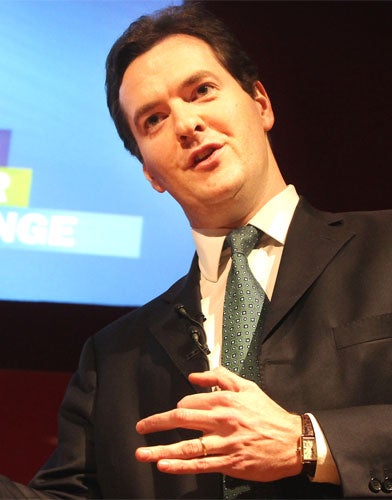Brown is the Prime Minister of negative growth, says Osborne

Your support helps us to tell the story
From reproductive rights to climate change to Big Tech, The Independent is on the ground when the story is developing. Whether it's investigating the financials of Elon Musk's pro-Trump PAC or producing our latest documentary, 'The A Word', which shines a light on the American women fighting for reproductive rights, we know how important it is to parse out the facts from the messaging.
At such a critical moment in US history, we need reporters on the ground. Your donation allows us to keep sending journalists to speak to both sides of the story.
The Independent is trusted by Americans across the entire political spectrum. And unlike many other quality news outlets, we choose not to lock Americans out of our reporting and analysis with paywalls. We believe quality journalism should be available to everyone, paid for by those who can afford it.
Your support makes all the difference.George Osborne will today accuse Gordon Brown of becoming the first prime minister to preside over a slide in the size of the British economy.
The shadow Chancellor will also signal that the Conservatives are to put the huge scale of the national debt – forecast to reach £178bn this financial year – at the heart of their election campaign.
Mr Osborne will argue that economic output per person has fallen since the last election in 2005 – a feat unparalleled in recent political history.
As the pre-election sparring intensified, a senior Cabinet minister denounced the Conservatives for, "facing both ways on economic policy". David Miliband, the Foreign Secretary, ridiculed Tory claims to have changed their values, adding: "Today's Conservatism looks more and more like a toxic cocktail of Tory traditions."
Mr Osborne's attack will come in the annual Mais lecture in the City of London. In a sign that economists are preparing for a change of government, he is the first Conservative politician invited to deliver the lecture since Michael Heseltine in 1996. Speaking on the eve of the lecture, Mr Osborne said: "Even through the dark days of the 1970s and the recessions of the early 1980s and 1990s, the growth of GDP per capita was sustained in every full Parliament.
"When people ask the famous question 'are you better off than you were five years ago?', Gordon Brown is the first prime minister in modern British history who has to answer no."
Mr Osborne will argue that Britain's gross domestic product has dropped from £20,883 per head in 2005 to £20,602 this year, a fall of £281. He will say that this is the first time in half a century that output per person has fallen over a full parliament. The only other time it fell, according to Mr Osborne, was during the eight month parliament that followed the February general election.
Labour will argue during the campaign that starting to cut the national debt too early could jeopardise the country's recovery from recession and will accuse the Tories of planning to slash frontline services.
In a magazine interview published yesterday, Mr Brown insisted the Government's debt reduction programme was "probably the most ambitious of any of the G7 countries". He said: "It contains, obviously, public-spending economies, cuts in some departments, efficiency savings in others, but protection of the front-line services in health and education and policing."
The Cabinet discussed election strategy yesterday – in particular how to campaign on law and order – as opinion polls suggest Labour is slowly clawing back the Conservative lead. The latest survey showed a seven-point gap between the parties.
Join our commenting forum
Join thought-provoking conversations, follow other Independent readers and see their replies
Comments